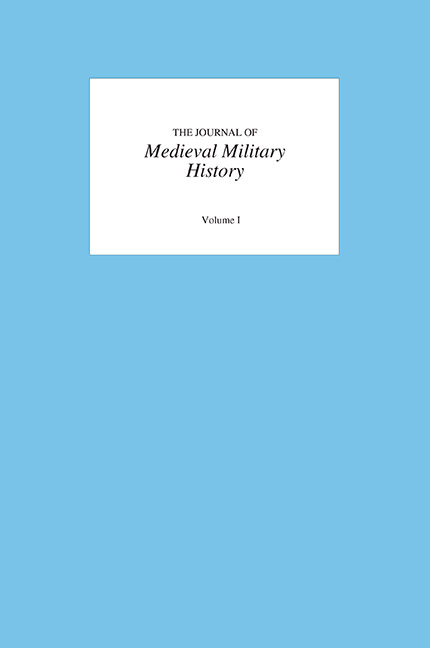Book contents
- Frontmatter
- Contents
- Editor's Introduction
- 1 The Vegetian ‘Science of Warfare’ in the Middle Ages
- 2 Battle Seeking: The Contexts and Limits of Vegetian Strategy
- 3 Italia – Bavaria – Avaria: The Grand Strategy behind Charlemagne's Renovatio Imperii in the West
- 4 The Composition and Raising of the Armies of Charlemagne
- 5 Some Observations on the Role of the Byzantine Navy in the Success of the First Crusade
- 6 Besieging Bedford: Military Logistics in 1224
- 7 ‘To aid the Custodian and Council;’ Edmund of Langley and the Defense of the Realm, June – July 1399
- 8 Flemish Urban Militias against the French Cavalry Armies in the Fourteenth and Fifteenth Centuries
Editor's Introduction
Published online by Cambridge University Press: 12 September 2017
- Frontmatter
- Contents
- Editor's Introduction
- 1 The Vegetian ‘Science of Warfare’ in the Middle Ages
- 2 Battle Seeking: The Contexts and Limits of Vegetian Strategy
- 3 Italia – Bavaria – Avaria: The Grand Strategy behind Charlemagne's Renovatio Imperii in the West
- 4 The Composition and Raising of the Armies of Charlemagne
- 5 Some Observations on the Role of the Byzantine Navy in the Success of the First Crusade
- 6 Besieging Bedford: Military Logistics in 1224
- 7 ‘To aid the Custodian and Council;’ Edmund of Langley and the Defense of the Realm, June – July 1399
- 8 Flemish Urban Militias against the French Cavalry Armies in the Fourteenth and Fifteenth Centuries
Summary
Consistent with the tastes of the educated reading public throughout the West, students in American colleges and universities for a very long time have filled and, indeed, have overfilled, classes in military history. Courses dealing with war and its multifaceted influence, however, are few and far between in our institutions of higher education because the work of specialists in military history is not highly regarded by many of our colleagues. On the eve of the Second World War, Sir Charles Oman, the doyen of Anglophone military historians, tried to explain this dissonance and argued with especial attention to the Middle Ages: “Both the medieval monastic chroniclers and the modern liberal historiographers had often no closer notion of the meaning of war than that it involves various horrors and is attended by a lamentable loss of life. Both classes strove to disguise their personal ignorance or dislike of military matters by deprecating their importance and significance in history.”
Educated citizens, apparently as contrasted to the majority of academics, are painfully aware that throughout the history of Western civilization, war, preparation for war, and the aftermath of war have dominated society. As a result, the informed citizenry of the democratic West have concluded that these topics deserve our concentrated attention. In the medieval West, the focus of this journal, the greatest part of surplus human and material resources was utilized for building and maintaining fortifications such as town walls, castles, and lesser strongholds. In addition, during the Middle Ages, the production of arms and armor, the creation of stud farms for breeding “war” horses, and the construction of roads and bridges, as well as the ongoing maintenance of these infrastructural components of the society and economy were voracious consumers of resources. In social perspective, war provided then as it does today a major road to upward mobility for those who were successful and for their families. Politically, of course, war was then and remains the pursuit of diplomacy by other means.
Sir Charles Oman's insights into the regrettable but perhaps understandable behavior of academics, who had been thoroughly traumatized by the great losses suffered in the First World War, ring true.
- Type
- Chapter
- Information
- Journal of Medieval Military HistoryVolume I, pp. vii - ixPublisher: Boydell & BrewerPrint publication year: 2002



